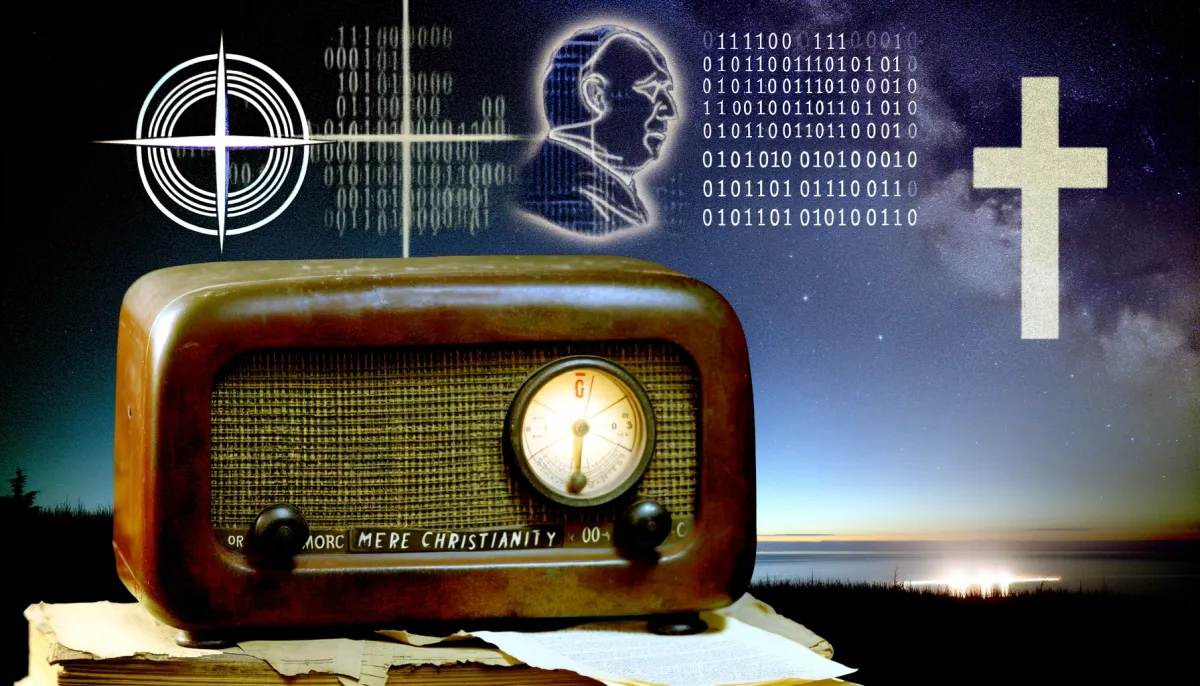Book Review: "Mere Christianity" by C.S. Lewis - Book 1: "Right and Wrong as a Clue to the Meaning of the Universe"

Read Mere Christianity for Free at the Internet Archive
Buy Mere Christianity at Amazon
As I continue to evolve my worldview and outlook, I'm inspired by approaching things from an integrative perspective. Metamodernism offers a unique viewpoint that equally considers mind, matter, and substance in a continuous oscillation between the material and metaphysical. Today, as I reflect on C.S. Lewis' "Mere Christianity," I'm reminded of the tumultuous times when it was conceived. During WWII, amidst the harrowing backdrop of The Blitz, Lewis's radio broadcasts offered hope and moral clarity to the besieged people of Great Britain. In this historical crucible, "Mere Christianity" was forged, bringing with it a timeless exploration of moral philosophy.
Lewis, the author of "The Lion, the Witch, and the Wardrobe" and the rest of the "Chronicles of Narnia" series, is well-known in some Christian circles for his spiritual writings, which have been widely overlooked outside of those in the Christian faith. I hope this and the reviews of the other book(let)s in "Mere Christianity" (a short read at 227 total pages between 4 books) help to expand your perspective on these topics. In the next four days, I plan to share my perspective about each of the four books that comprise "Mere Christianity." This exploration will not just be a review in the traditional sense but a personal inquiry into the timeless questions and moral dilemmas Lewis presents. Each day will be dedicated to one book, starting with "Book 1: Right and Wrong as a Clue to the Meaning of the Universe," where Lewis lays the philosophical foundation of his argument.
The Dichotomy of Existence Views:
Book 1 opens with a profound contrast between the chance view of existence and the religious view of creation. Lewis's exploration of these conflicting perspectives lays the groundwork for a deeper understanding of the universe's moral fabric. My musings on John Archibald Wheeler's participatory universe find a curious resonance here. This modern theory, intertwining chance and intentional creation offers a nuanced lens through which to view Lewis's dichotomy, reflecting a universe that is both random and purposefully crafted.
Lewis's poignant statement, "We do not merely observe men, we are men," is self-evident. This perspective underscores our role as observers of morality and active participants in its unfolding. It's a reminder that we are not outside entities but integral players in the intricate dance of the physical and immaterial.
The idea that Humanity is on the wrong path and must return to its moral roots is compelling. In my personal and professional journey, I've seen parallels in the necessity to recalibrate strategies and realign with core principles. Foundations matter and operating from first principles is an essential consideration as we engage in our pursuits. Lewis's metaphor of retracing our steps for a quicker progression mirrors the process of revisiting sociotechnical system flaws to address contemporary challenges.
Lewis presents a complex relationship with God, portraying Him as both the ultimate source of comfort and an object of supreme terror. This duality resonates with my experiences in science and technology (and life in general), where solutions often bring new challenges. God, in Lewis' view, embodies the ultimate paradox – the convergence of our deepest fears and greatest hopes.
Finally, Lewis asserts that the path to comfort in Christianity begins with dismay. This idea echoes the journey of learning and growth, where understanding and acceptance often arise from confronting challenges. Drawing from my experiences in education and leadership, I see a parallel in the necessity of facing brutal truths for genuine advancement and enlightenment.
Humanity's Shared Journey in "Mere Christianity"
In Book 1 of "Mere Christianity," C.S. Lewis brings to the forefront the idea of "Humanity's Shared Journey," a theme that resonates profoundly with my own experiences and beliefs. Lewis argues that we are active participants, not mere observers of morality and existence. Each individual's actions and moral choices contribute to the larger tapestry of human experience.
In a broader sense, Lewis's focus on this journey through moral and existential questions invites us to consider how our individual lives and choices are interconnected. It challenges us to think about how our actions, whether in technology, security, or everyday life, contribute to the collective human story. It's a reminder that in the pursuit of understanding our place in the universe, we are all traveling together, influencing and being influenced by each other. After all, empathy is contagious.
The Realization of Wrongdoing:
Lewis touches on a poignant theme in Book 1: recognizing that Humanity may be on the wrong path and must correct course. He eloquently states, "Humanity has been making some big mistake. We are on the wrong road. And if that is so, we must go back. Going back is the quickest way on." This mirrors a fundamental life principle: recognizing and rectifying our mistakes to progress. In my experience, acknowledging errors and revisiting foundational principles have often been the first steps toward innovative solutions and enhanced security strategies. Lewis's metaphor of retracing steps to find the correct path is a powerful reminder of the importance of humility and introspection, not just in personal morality but also in our professional endeavors. This realization of wrongdoing, according to Lewis, is not just about acknowledging our faults but about understanding our role in a larger moral landscape. It's a call to realign our actions with a higher ethical standard.
The Paradox of God:
Lewis describes God as both the ultimate source of comfort and the most profound terror - a being who is our only faithful ally and yet one we have positioned as our enemy. This paradox mirrors the complexities I encounter in informatics and AI. Just as God represents the (non)dualism of comfort and terror, technology can be a double-edged sword, offering incredible possibilities for advancement and connection while posing significant ethical and security risks. In this light, Lewis's depiction of God challenges us to contemplate the multifaceted nature of power, be it divine or technological, and our relationship with it. I am reminded of how "carpenter" in Kainon Greek, the language of the New Testament, is "tektón" - the same root as the word "technology" and "architect" with the literal translation meaning "begetter."
The Journey Through Dismay to Comfort:
C.S. Lewis concludes Book 1 with a compelling assertion: the path to understanding and comfort in Christianity begins with a phase of dismay. This journey, from realizing our own moral failings and the discomfort accompanying them, is crucial for genuine spiritual and personal growth. This Phoenician journey, the hero's journey, is considered by some to be the only real story. The road to proper understanding often begins with acknowledging our limitations or misconceptions. Just as Lewis suggests that comfort in faith is preceded by discomfort, in science and technology, breakthroughs and advancements often follow the acknowledgment of challenges and setbacks. This journey from dismay to comfort is not just spiritual but a universally applicable principle in the quest for knowledge and improvement.
Transition to Book 2:
As we wrap up our exploration of Book 1, we anticipate delving into Book 2 of "Mere Christianity" tomorrow. Titled "What Christians Believe," this next section promises to take us deeper into the core tenets of the Christian faith, as explored by Lewis. In this forthcoming review, we'll examine how Lewis builds upon the philosophical foundations in the first book, moving into more specific theological discussions. I invite you to continue with me tomorrow to see how Lewis's arguments evolve and intersect with contemporary technology, ethics, and human interaction issues. We'll further explore the contrast between the chance view of existence and the religious view of creation, dive into Lewis's insights on Humanity's role in understanding morality and examine the compelling paradoxes and metaphors he uses to describe our relationship with the divine.
